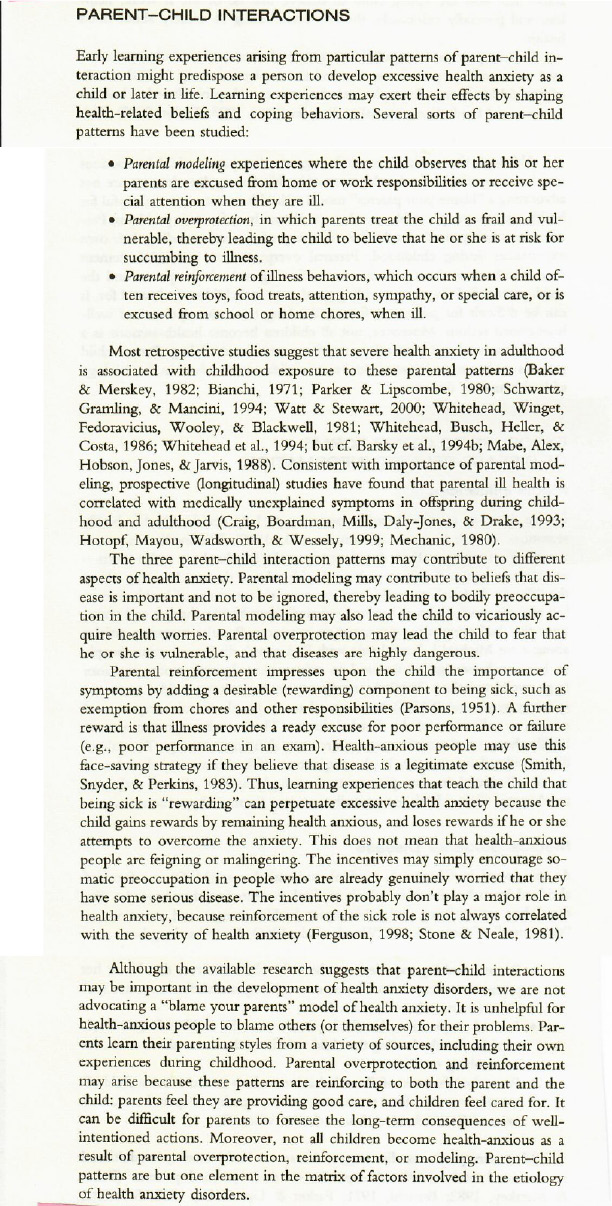| Login | ||

Healthcare Training Institute - Quality Education since 1979
CE for Psychologist, Social Worker, Counselor, & MFT!!

Section 9
Parenting Behaviors and Child Anxiety
This content is intended for
Social Workers, Couneslors, MFT's, and Psychologists
Question
9 | Test | Table of Contents
The content below was not available in digital format.
To increase text size, maximize window then click Ctrl +

Taylor, S., & Asmundson, G., J. G. (2004). Treating Health Anxiety: A Cognitive-Behavioral Approach. New York, NY: The Guilford Press. 56-58.
Update
Effect of Parenting Intervention
Through "Care for Child Development Guideline"
on Early Child Development and Behaviors:
A Randomized Controlled Trial
Bemanalizadeh, M., Badihian, N., Khoshhali, M., Badihian, S., Hosseini, N., Purpirali, M., Abadian, M., Yaghini, O., Daniali, S. S., & Kelishadi, R. (2022). Effect of parenting intervention through "Care for Child Development Guideline" on early child development and behaviors: a randomized controlled trial. BMC pediatrics, 22(1), 690.
Peer-Reviewed Journal Article References:
Gulley, L. D., Oppenheimer, C. W., & Hankin, B. L. (2014). Associations among negative parenting, attention bias to anger, and social anxiety among youth. Developmental Psychology, 50(2), 577–585.
Negreiros, J., & Miller, L. D. (2014). The role of parenting in childhood anxiety: Etiological factors and treatment implications. Clinical Psychology: Science and Practice, 21(1), 3–17.
Nook, E. C., Vidal Bustamante, C. M., Cho, H. Y., & Somerville, L. H. (2020). Use of linguistic distancing and cognitive reappraisal strategies during emotion regulation in children, adolescents, and young adults. Emotion, 20(4), 525–540.
Shepardson, R. L., Minnick, M. R., & Funderburk, J. S. (2020). Anxiety interventions delivered in primary care behavioral health routine clinical practice. Families, Systems, & Health, 38(2), 193–199.
Stevens, E. N., Bardeen, J. R., & Murdock, K. W. (2015). Parenting behaviors and anxiety in young adults: Effortful control as a protective factor. Journal of Individual Differences, 36(3), 170–176.
Van der Giessen, D., Colonnesi, C., & Bögels, S. M. (2019). Changes in rejection and psychological control during parent–child interactions following CBT for children’s anxiety disorder. Journal of Family Psychology, 33(7), 775–787.
Wei, C., Cummings, C. M., Villabø, M. A., & Kendall, P. C. (2014). Parenting behaviors and anxious self-talk in youth and parents. Journal of Family Psychology, 28(3), 299–307.
QUESTION
9
Regarding parent-child interactions and Health Anxiety, early learning experiences arise from particular patterns of parent-child interaction that might predispose a person to develop excessive health anxiety as a child later in life. Learning experiences may exert their effects by shaping health-related beliefs and coping behaviors. What are the three types of parent-child patterns that would affect the development of health anxiety? To select and enter your answer go to Test.

